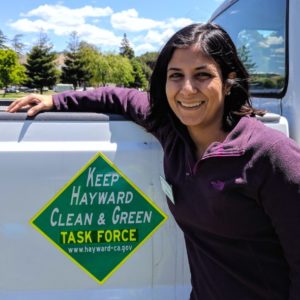
Arti Garg
Arti Garg is a data scientist and technologist. She is the founder and Chair of Engineers & Scientists Acting Locally. She serves as a member of the Keep Hayward Clean and Green Task Force in Hayward, Calif. In the past she has served as a legislative adviser in the U.S. House of Representatives, and she oversaw energy-related research investments in the White House Budget Office. She became interested in the intersection between STEM expertise and local policy through her professional work developing smart grid innovation and distributed energy solutions. She holds a PhD in physics and an MS in Aerospace Engineering.
Thank you for visiting Engineers & Scientists Acting Locally! ESAL is an organization dedicated to increasing local civic engagement by STEM-trained (science, technology, engineering, and math) professionals. We are a nonpartisan, non-advocacy group. Our goal is to help you become more involved in your communities by sharing opportunities, organizing events, and providing you with practical information and a forum for sharing ideas and seeking advice.
I am a physicist-turned-technologist, by way of being a policy analyst in Washington, DC. I currently serve on a standing task force with my city government. I founded ESAL to build connections with other STEM-professionals similarly involved in their communities and to help others who would like to increase their engagement. I believe many of us want to be more active participants in our communities, but it can be difficult to figure out how we can make a difference. Especially when we are also balancing demanding jobs and family commitments. ESAL aims to provide you with ideas, opportunities, and resources to engage with your communities in ways that are compatible with your life.
When I tell people about ESAL, I usually get several questions. Among the most common are: (1) Why focus on STEM-trained professionals? (2) Why focus on local civic engagement (and what do you mean by that)?
To the first question, I answer that STEM-trained professionals share a common perspective and approach that ESAL can help direct toward valuable contributions to their community. Most straightforwardly, many issues impacting local communities directly tie to STEM domains. Most of us are familiar with how we can engage in these discussions as an “expert”, injecting facts into the dialogue. But all too often, we believe our role as community members ends there. I argue that even for issues that are not directly STEM-related, STEM-trained professionals can offer valuable perspectives on how to make evidence-informed decisions and can also help design community interventions around testable ideas. Initially, this kind of engagement may feel uncomfortable, but it’s important to remember that we are each much more than our degree or profession. Involving ourselves more deeply in our communities--especially by listening to the needs of community members and policymakers--can reap personal, societal, and even professional benefits.
Why focus on local civic engagement? STEM-trained professionals often believe that they just need to vote--or maybe they need to go to Washington, DC, to contribute to issues they care about. While many of us may feel passionate about issues that have a national or global dimension, a focus on these aspects misses the fact that most ideas, to be impactful, have to be implemented locally. From addressing environmental impacts to fostering private sector innovation to improving digital literacy, the details are hashed out at the local level in the form of municipal building permits, urban planning, tax incentives, community volunteers, and much more. In addition, by engaging with their city or state governments or working with local non-profits, STEM-trained professionals can begin to cross the chasm that has grown between our professional communities and the communities in which we live. We are trained to approach problems by applying the methods and expertise we have gained through our work, sometimes in a way that diminishes the value of the perspectives and contributions of others. Local governance is a community endeavor requiring mutual respect and understanding. If we want our ideas to be heard, we have to listen with an open mind to others’. Working with our friends and neighbors provides a shared context for doing that.
So welcome to the Engineers & Scientists Acting Locally community. ESAL’s goal is to help you get more involved in your local communities. Please email us at info@esal.us with ideas for events, activities, and resources that would be most useful or interesting to you...and also sign up to receive our latest updates.